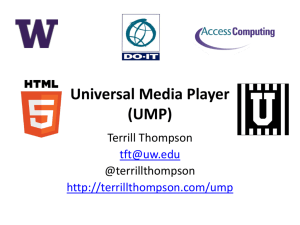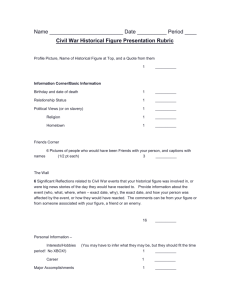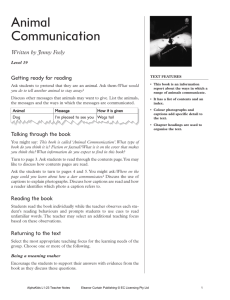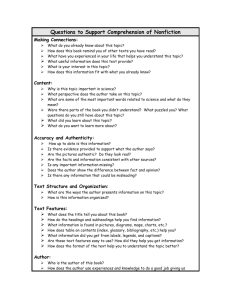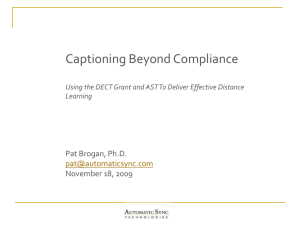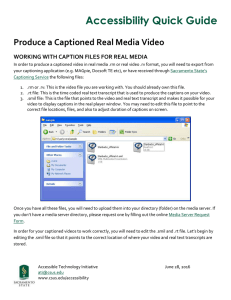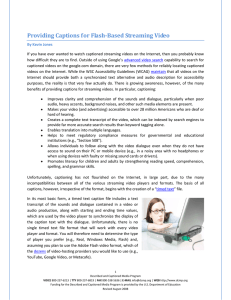Accessible Video in Two Parts - UW Staff Web Server
advertisement
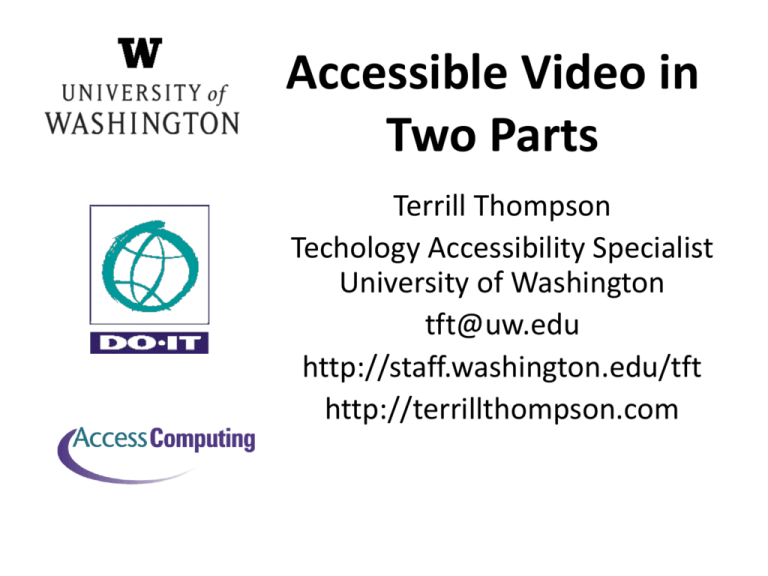
Accessible Video in Two Parts Terrill Thompson Techology Accessibility Specialist University of Washington tft@uw.edu http://staff.washington.edu/tft http://terrillthompson.com Agenda Part 1: Nuts and Bolts • Closed captions • Description • Accessible media players Part 2: Making the Case • Exploring enterprisewide strategies for making video accessible Part 1 Approaches to Captioning 1. Let machines do it for you 2. Hire a captioning vendor 3. Recruit and manage volunteers (crowdsourcing) 4. Do it yourself! (DIY) Free or Cheap Captioning Tools • MAGpie (Windows) – http://ncam.wgbh.org/invent_build/web_multime dia/tools-guidelines/magpie • Subtitle Workshop (Windows) – http://www.urusoft.net/products.php?cat=sw&la ng=1 • Movie Captioner (Mac & Windows; not free) – http://www.synchrimedia.com/ More Free or Cheap Captioning Tools • CapScribe – from U of Toronto – also supports audio description – http://cnice.idrc.ocad.ca/tools.php Free Online Captioning Tools • Amara (formerly Universal Subtitles) – http://amara.org • DotSub – http://dotsub.com • Subtitle Horse – http://subtitle-horse.com • CaptionTube – http://captiontube.appspot.com The Closed Captioning Process • Transcribe video into caption-sized segments • Use a captioning tool to timestamp the transcript • Save to an output file that is appropriate for your media type Flavors of Closed Captions • SubRip – SRT file, very simple and widely supported • Timed Text Markup Language (TTML) – A W3C standard • WebVTT – The preferred format for HTML5 • And many more… supports video accessibility <video src="myvideo.mp4"> </video> supports captions <video controls> <source src="myvideo.mp4" type="video/mp4"> <source src="myvideo.webm" type="video/webm"> <track kind="captions" src="mycaptions.vtt" default> </video> Description, a.k.a. • • • • Audio description Video description Described video Descriptive narration What is Description? • A separate narrative track, for people who can’t see critical visual content • Can be avoided by assuring that all important information is communicated visually and audibly Types of Description (in descending order by quality/cost) 1. Recorded audio, remixed into video production 2. Recorded audio as a separate audio file, synched with video by the media player 3. WebVTT text-based description, read by assistive technologies during playback DIY Text-based Description • Use a captioning tool to compose description text and synch it with the video • Insert brief descriptions during periods when there is no competing audio content • Allow enough time for a screen reader to read the description (your best estimate) • Include all on-screen text • Include succinct descriptions of any visual information that is integral to the communication • Export to WebVTT for (theoretical) use in HTML5 video player supports description too! <video controls> <source src="myvideo.mp4" type="video/mp4"> <source src="myvideo.webm" type="video/webm"> <track kind="captions" src="mycaptions.vtt" default> <track kind="descriptions" src="mydesc.vtt"> </video> Hiring Vendors • Captioning Service Vendors – http://www.dcmp.org/ai/10/ • Description Service Vendors – http://www.dcmp.org/ai/179/ Source for both: Described and Captioned Media Program (DCMP) Media Player Considerations • Does it support closed captions? • Are controls accessible by keyboard? • Are controls properly labeled for screen reader users? • Does it support closed text-based description? • Does it include an Application Program Interface (API) so you can extend its functionality (e.g., with video search or an interactive transcript)? Internet Explorer 10 has good support for accessibility Universal Media Player (UMP) UMP Features • Support for closed captions • Support for closed text-based description • Support for description via swapping to an alternative video source • Fully accessible player controls • A fallback player (JW Player) that looks and behaves exactly like the main player • Ability to search videos using their captions • An interactive transcript (assembled using captions and description) • Controllable with hot keys from anywhere on the page • Customizable via Settings button Video Search Interactive Transcript Customizable More on DO-IT Video and UMP • Our website: – http://uw.edu/doit/video • The open source Universal Media Player (UMP): – Coming soon – Watch http://terrillthompson.com/blog Part 2 Agenda Part 1: Nuts and Bolts • Closed captions • Description • Accessible media players Part 2: Making the Case • Exploring enterprisewide strategies for making video accessible Making the case: Who benefits from accessible video? • People who are unable to hear the audio • People who are unable to see the video • People who are unable to use a mouse • People with cognitive disabilities Making the case: Who else benefits from accessible video? • People whose first language is not the one spoken in the video • People who don't understand the language of the video at all • People who have low Internet bandwidth • People who need to search for particular video content • People who are busy Video search is here Example from MIT OpenCourseware: http://interactive.3playmedia.com/mitocw/ Video translation is here Example is from youtube.com Interactive transcripts are here Captioned video supports research Example is from http://www.aljazeera.com/indepth/interactive/ We want all videos to be captioned Percent of a university's video accessibility barriers removed by captioning one academic course as an individual accommodation How do we get there? Various Models • Make it affordable – Negotiate a great price with a vendor • Make it easy – Simple web portal for getting and receiving captioned media • Crowdsourcing? – Academic credit or work study for students – Worthwhile project for alumni & other volunteers • Develop an in-house service TEDTalks: A Crowdsourcing Success Story • 43,490 translations • 101 languages • 9915 volunteer translators Inspiring People to Use What you Build • Evangelize – talk about the benefits • Persuade your institution to embrace and implement the benefits (search, translation, interactive transcripts, etc.) • Create a culture where anyone who is not captioning their video is square • Institutional policy: All video must be accessible
